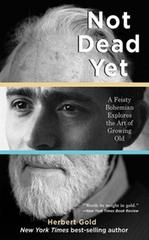 Herbert Gold, a San Francisco writer "who became, by attrition, the last of an era to pound away at a manual typewriter in a rent-controlled apartment overstuffed with books and papers," died November 19 at age 99, the San Francisco Chronicle reported. During his career, which began with publication of his first novel, Birth of a Hero (1951), Gold released two dozen novels, five collections of stories or essays, and eight nonfiction books of reportage or memoir. He published Not Dead Yet: A Feisty Bohemian Explores the Art of Growing Old in 2011, followed by Nearing the Exit (2018). He liked to joke that the trilogy would be completed by OK, Finally, but he never wrote the book to support that title," the Chronicle noted. His final book, a poetry collection titled Father Verses Sons, will be published March 9, 2024, which would have been his 100th birthday.
Herbert Gold, a San Francisco writer "who became, by attrition, the last of an era to pound away at a manual typewriter in a rent-controlled apartment overstuffed with books and papers," died November 19 at age 99, the San Francisco Chronicle reported. During his career, which began with publication of his first novel, Birth of a Hero (1951), Gold released two dozen novels, five collections of stories or essays, and eight nonfiction books of reportage or memoir. He published Not Dead Yet: A Feisty Bohemian Explores the Art of Growing Old in 2011, followed by Nearing the Exit (2018). He liked to joke that the trilogy would be completed by OK, Finally, but he never wrote the book to support that title," the Chronicle noted. His final book, a poetry collection titled Father Verses Sons, will be published March 9, 2024, which would have been his 100th birthday.
During his life, he hitchhiked alone from Cleveland to San Francisco as a teenager ("I had planned to run away since I was very young as an adventure."); was trained to parachute in to aid the Soviets during World War II; was connected to Allen Ginsberg and Jack Kerouac at Columbia ("I was very good friends with Allen Ginsberg. I crossed the street to avoid Jack Kerouac. He was a bad drunk and a liar even then."); and a freelance foreign correspondent in war zones for newspapers and magazines.
He worked as a screenwriter for hire to both Saul Zaentz and Natalie Wood, though no film came from either of the arrangements. He was never able to adapt any of his novels into screenplays, and liked it better when other people would try. The Man Who Was Not With It was optioned 17 times. "I loved people buying the rights to try to make a movie of mine," he said.
"I don't have a shortage of ideas," Gold said in an interview when he was 94. "Life is rich for me. I have written about divorce. I've been divorced twice. I've written about being a Jew growing up in a completely non-Jewish world. I've written about my affiliation with the Bay Area beatniks."
"He is an extraordinary American success story," said Will Farley, a film director and longtime movie-going friend of Gold. "As a young man, he found his fight as a storyteller and he has done it all."
Gold's most successful novel was Fathers, based on his upbringing outside Cleveland. It was translated into several languages. Farley observed: "Fathers allowed me to see my father in a deeper way and had a major impact on my ability to love my father. You can't do that unless you are a writer of deep feeling and great empathy."
Gold's other books include Salt (1963); The Great American Jackpot (1969); My Last Two Thousand Years (1972); Swiftie the Magician (1974); He/She (1980); Family (1981); True Love (1982); A Girl of Forty (1986); Dreaming (1988); She Took My Arm as if She Loved Me (1997); and When a Psychopath Falls in Love (2014).
He always denied being a Luddite, saying his use of a typewriter was pragmatic: "For me, writing is an act of sculpture. I get mad at the words I put on the page and I can rip the page out. I can kick it when I'm annoyed."
On September 3, he participated in a poetry reading at City Lights bookstore in celebration of its 70th anniversary, the New York Times noted. Two days later, Scribner published Best American Poetry of 2023, which includes Gold's poem "Other News on Page 24":
Someone famous will die that day,
My day,
And the newspaper will report:
"More obituaries on page 24."
For the curiosity of some,
the regret of several,
and the grief of a few.
Those few, they matter,
So they have a nice walk
in the Marin headlands
shadowed by a weary and worn mountain
(still green! still fragrant!
with pine and transplanted eucalyptus,
and most important: Still there!),
where I'm proud that the few gather trash,
but drop my ashes downwind,
and remember as I fly away.

